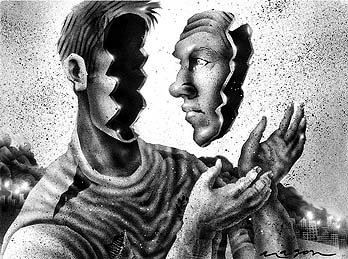The profound excellence, an artist’s work of art achieves from translating an idea into a concrete shape, principally owes its credit to the inner drive for expression that artists experience in some superior quantum than laymen. The locus of all thoughts and feelings is always the self, comprising of mind, heart and body. The events inside a self can be both blithe and anarchic. Therefore, artistic expressions oscillate between the beautiful and the grotesque, the living and the dead, the happy and the melancholic and so on. For instance, art can manifest all moods which are fortressed in a turbulent heart, in a perturbed mind and in a bruised body. In this vastly split territory of aesthetic dualism, the artist is found encroaching upon the haze in the grey areas of the self which can also be called the no man’s land. A serious artist is the one who crazily weaves cryptic cobwebs in those lands like a spider while inundating his/her whole body and soul (heart and mind) in this holy enterprise of discovery, invention and creation. In the world of so called “high culture,” the artists with this brand of habits and work ethics are revered as the worshippers of their art.
A subtle shift of perspective from the abstract world of art to the realm of real life, will reveal an unending territory of identical intellectual conundrums and ambivalent moral choices, that a common individual has to tread like a scared squirrel upon the land mines of uncertainties or like a careless child’s gallops on the beach sand. The latter approach is the most widely followed one by the contemporary hedonists, realists and the empiricists whereas the idealists, reflecting ideologues and the contemplative souls wage a secret battle between their body and soul to forge an amicable pact between the two. And this perpetually and simultaneously updating and breaking up pact, is tinned according to their understanding of truth, reality and goodness at the given moment of time. There is a scarce margin of doing a biased value judgment of either of the approaches as neither has harboured humanity to the eternal peace and calm that could theme the plot of an ideal narrative of life. This is especially because of a noticeable decline by one camp to accept the other’s thrust upon material and this worldly success as the yard stick to a purposeful life. From this spot of difference, the fountains of theology, ethics, morals, values and philosophic speculations are untapped to irrigate a dry terrain of opportunism and selfish interest based competitions. This insurrection against a Darwinian view of the world is actually against the notion which states that competition inheres in all individual collectivities like communes, cultures and nations and therefore, ‘winner take it all’ elixir is justified.
A further zeroing in of our focus upon any individual’s maiden steps in such an unforgiving pool of devourers, yields spells of complicated and baffling cross question sessions that only an introspective soul can stage in the court of its mind. The first amongst those questions which inadvertently shakes walls of one’s mind, is related to education, both spiritual and conventional. If education is meant to tame and pacify human impulses to avarice, greed, murder, immorality and all other inhuman and wild frailties; why do the professionally trained and erudite individuals end up in a compromising moral position at their very first altar i.e. by becoming part of a ruthless and valueless market based system where individuals are treated like tools and commodities? An obvious escape from the self-flogging curses of one’s conscience is an argument of self preservation and survival. And in most other scenarios, the voices of conscience are muted by the craftiness of the justificatory discourse at the tail ends of an unconfessed guilt which reposes in some dullest chambers of one’s heart. The third and the rarest of the scenarios is an open confession of one’s guilt in the absence of outside duress. Individuals rarely reflect justly enough in a process of self accountability to charge themselves as guilty and worthy of persecution. Man is too biased a beast. On the other side of the picture, crime and sin are not mere aberrations of an inherently virtuous statue of the Homo sapiens. It is worth not overlooking that as there are people consciously dedicated to good, there is a genuine propensity and love for wickedness in people with a full knowledge of it as evil. Hence, evil in people is not an error of their judgment or a mistake. It is a conscious moral choice. The riddles of fate, on the other hand, are a usual recourse to shift the blame of their undoing, amongst the criminals. It is the prerogative of only the conscientious souls to indulge in a Hegelian sort of dialectical process of bringing in equation, thesis with the antithesis of virtually every idea to formulate a synthesis. In a mammon worshiping society whose foundations are devoid of a talk of morals, ethics and didacticism; the self of a conscientious individual will be left to itself to have feuds with itself about the choices it has been granted by the external world and those she deems best and moral for itself.
Beside carrying the historic tradition of imparting knowledge, if contemporary education system and the educational institutions are viewed in the post-modern world as mere instruments to wield power and strengthen edifices of power (government and its sister institutions) in society; an individual with genuine zeal to entrust his/her distinguished ideologies and thoughts to the world treasury of knowledge is found lacking in his/her amity for this whole system. This is one of those situations in which the universities polish the pebbles and waste the diamonds because this is their prescribed role by the system in which they breathe in. And that role is to manufacture a work force that market demands from them, so that they may chip in its structure without much fuss. Hence, the modalities of power are determined and spread right throughout the social system and its sister institutions. In this so called free market economic structure, this is a myth to postulate that individuals are free. It is a matter of paramount importance that in honour of the nuances of every individual self, the individuals should be empowered exactly on the pattern of the leverage the institutions enjoy. This has a promise of a more responsible and a loyal citizenry.
Aamir Aziz



